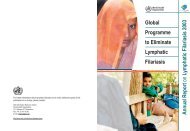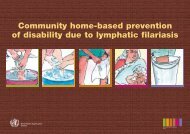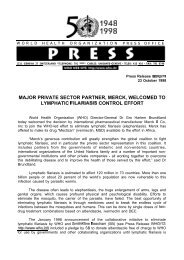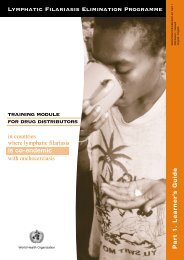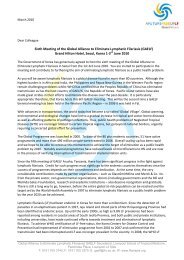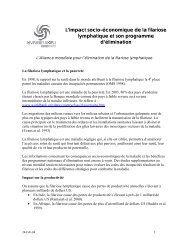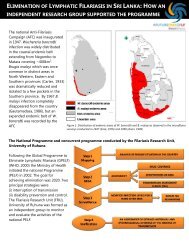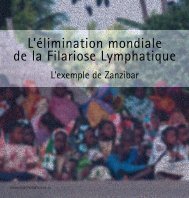English - Global Alliance to Eliminate Lymphatic Filariasis
English - Global Alliance to Eliminate Lymphatic Filariasis
English - Global Alliance to Eliminate Lymphatic Filariasis
Create successful ePaper yourself
Turn your PDF publications into a flip-book with our unique Google optimized e-Paper software.
REPORT OF THE 6 TH GAELF MEETING, JUNE 2010<br />
Executive Summary<br />
The 6 th Meeting of the <strong>Global</strong> <strong>Alliance</strong> <strong>to</strong> <strong>Eliminate</strong> <strong>Lymphatic</strong> <strong>Filariasis</strong> (GAELF) was held 1-3<br />
June, 2010 in Seoul, Korea. The theme of the meeting, “Half-time in LF Elimination: Teaming<br />
Up with NTDs,” highlighted the fact that 2010 marks the midpoint between the first GAELF<br />
meeting, held in 2000 in Santiago de Compostela, Spain, and the World Health Organization<br />
(WHO) goal of global elimination of lymphatic filariasis (LF) as a public health problem by<br />
2020. The “half-time” theme provided an appropriate backdrop for reflection, assessment,<br />
and planning. For many participants, it also coincided with eager anticipation of the World<br />
Cup, which began in South Africa three weeks later.<br />
Given the half-time theme, it was especially fitting that GAELF6 was held in the Republic of<br />
Korea, which in 2008 received official WHO verification that it had reached its goal of LF<br />
elimination. GAELF participants appreciated the opportunity <strong>to</strong> learn about the successful<br />
effort in Korea. The warm hospitality and seamless organization of the Korean hosts<br />
provided a superb and relevant setting for this important meeting.<br />
The presentations, by global experts on the epidemiology, treatment, research, and<br />
programme implementation of LF, highlighted the impressive accomplishments of GAELF’s<br />
first 10 years and provided insight in<strong>to</strong> the major remaining challenges facing GAELF. Both<br />
accomplishments and challenges were articulated by several “case studies” from LFendemic<br />
countries. Formal and informal discussions were lively and focused. Two themes, in<br />
particular, infused almost every presentation and discussion. First, LF elimination is<br />
increasingly integrated in<strong>to</strong> a larger initiative <strong>to</strong> control neglected tropical diseases (NTDs);<br />
hence, the theme “Teaming up with NTDs.” Implications of this “teaming up” will affect all<br />
aspects of the GPELF, including drug regimens, advocacy, governance, financing, moni<strong>to</strong>ring<br />
and evaluation, partnerships, morbidity management, vec<strong>to</strong>r control, research, and<br />
programme implementation. Secondly, the global health landscape has undergone<br />
remarkable changes since the GAELF was established, which has resulted in new<br />
partnerships, initiatives, and funding opportunities. These changes will only accelerate<br />
during the next 10 years, and foresight, flexibility, and strength of purpose will all be<br />
required.<br />
Half-time Assessment<br />
The magnitude of the challenge facing the GAELF in 2000 was staggering. 81 countries were<br />
considered endemic for LF, with 1.34 billion persons at risk of infection and 120 million<br />
infected. WHO, as the lead agency in the <strong>Global</strong> Programme <strong>to</strong> <strong>Eliminate</strong> <strong>Lymphatic</strong><br />
<strong>Filariasis</strong> (GPELF), established two major strategies <strong>to</strong> achieve the 2020 goal: 1) s<strong>to</strong>pping the<br />
spread of infection through annual mass drug administration (MDA) using 2-drug<br />
combinations; and 2) reducing the burden of disease through morbidity management. WHO<br />
recommended a stepwise approach <strong>to</strong> interrupt LF transmission, beginning with mapping<br />
the distribution of LF <strong>to</strong> identify areas in need of MDA, followed by five or more years of<br />
MDA, a period of post-MDA surveillance, and, ultimately, verification of LF elimination.<br />
9



